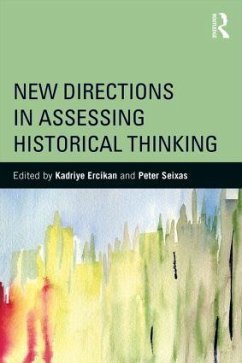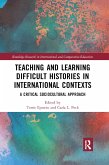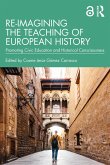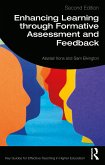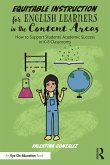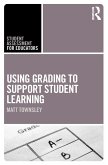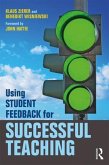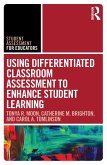New Directions in Assessing Historical Thinking
Herausgeber: Ercikan, Kadriye; Seixas, Peter
New Directions in Assessing Historical Thinking
Herausgeber: Ercikan, Kadriye; Seixas, Peter
- Broschiertes Buch
- Merkliste
- Auf die Merkliste
- Bewerten Bewerten
- Teilen
- Produkt teilen
- Produkterinnerung
- Produkterinnerung
New Directions in Assessing Historical Thinking is a critical, research-oriented resource that will advance the conceptualization, design and validation of the next generation of history assessments.
Andere Kunden interessierten sich auch für
![Teaching and Learning Difficult Histories in International Contexts Teaching and Learning Difficult Histories in International Contexts]() Teaching and Learning Difficult Histories in International Contexts41,99 €
Teaching and Learning Difficult Histories in International Contexts41,99 €![Re-imagining the Teaching of European History Re-imagining the Teaching of European History]() Re-imagining the Teaching of European History38,99 €
Re-imagining the Teaching of European History38,99 €![Enhancing Learning through Formative Assessment and Feedback Enhancing Learning through Formative Assessment and Feedback]() Alastair IronsEnhancing Learning through Formative Assessment and Feedback30,99 €
Alastair IronsEnhancing Learning through Formative Assessment and Feedback30,99 €![Equitable Instruction for English Learners in the Content Areas Equitable Instruction for English Learners in the Content Areas]() Valentina Gonzalez (ESL)Equitable Instruction for English Learners in the Content Areas45,99 €
Valentina Gonzalez (ESL)Equitable Instruction for English Learners in the Content Areas45,99 €![Using Grading to Support Student Learning Using Grading to Support Student Learning]() Matt TownsleyUsing Grading to Support Student Learning32,99 €
Matt TownsleyUsing Grading to Support Student Learning32,99 €![Using Student Feedback for Successful Teaching Using Student Feedback for Successful Teaching]() Klaus ZiererUsing Student Feedback for Successful Teaching27,99 €
Klaus ZiererUsing Student Feedback for Successful Teaching27,99 €![Using Differentiated Classroom Assessment to Enhance Student Learning Using Differentiated Classroom Assessment to Enhance Student Learning]() Tonya R. MoonUsing Differentiated Classroom Assessment to Enhance Student Learning30,99 €
Tonya R. MoonUsing Differentiated Classroom Assessment to Enhance Student Learning30,99 €-
-
-
New Directions in Assessing Historical Thinking is a critical, research-oriented resource that will advance the conceptualization, design and validation of the next generation of history assessments.
Hinweis: Dieser Artikel kann nur an eine deutsche Lieferadresse ausgeliefert werden.
Hinweis: Dieser Artikel kann nur an eine deutsche Lieferadresse ausgeliefert werden.
Produktdetails
- Produktdetails
- Verlag: Taylor & Francis Ltd
- Seitenzahl: 286
- Erscheinungstermin: 4. März 2015
- Englisch
- Abmessung: 229mm x 152mm x 16mm
- Gewicht: 420g
- ISBN-13: 9781138018273
- ISBN-10: 1138018279
- Artikelnr.: 41609086
- Herstellerkennzeichnung
- Libri GmbH
- Europaallee 1
- 36244 Bad Hersfeld
- gpsr@libri.de
- Verlag: Taylor & Francis Ltd
- Seitenzahl: 286
- Erscheinungstermin: 4. März 2015
- Englisch
- Abmessung: 229mm x 152mm x 16mm
- Gewicht: 420g
- ISBN-13: 9781138018273
- ISBN-10: 1138018279
- Artikelnr.: 41609086
- Herstellerkennzeichnung
- Libri GmbH
- Europaallee 1
- 36244 Bad Hersfeld
- gpsr@libri.de
Kadriye Ercikan is Professor of Measurement, Evaluation, and Research Methodology, Faculty of Education, University of British Columbia, Canada. Peter Seixas is Professor of History Education, Faculty of Education, University of British Columbia, Canada.
Preface
Acknowledgements
Contributor Biographies
Introduction
Part I: Goals of History Education: Models of Historical Cognition and
Learning
1 Historical Consciousness in Germany: Concept, Implementation, Assessment
Carlos Kölbl & Lisa Konrad
2 The Difficulty of Assessing Disciplinary Historical Reading
Abby Reisman
3 Heritage as a Resource for Enhancing and Assessing Historical Thinking:
Reflections from the Netherlands
Carla van Boxtel, Maria Grever & Stephan Klein
4 Relating Historical Consciousness to Historical Thinking through
Assessment
Catherine Duquette
Commentary 1 Into the Swampy Lowlands of Important Problems
Robert B. Bain
Part 2: Issues in Designing Assessments of Historical Thinking
5 Assessing for Learning in the History Classroom
Bruce VanSledright
6 Historical Thinking, Competencies and their Measurement: Challenges and
Approaches
Andreas Körber & Johannes Meyer-Hamme
7 A Design Process for Assessing Historical Thinking: The Case of a
One-Hour Test
Peter Seixas, Lindsay Gibson & Kadriye Ercikan
8 Material-based and Open-ended Writing Tasks for Assessing Narrative
Competence among Students
Monika Waldis, Jan Hodel, Holger Thünemann, Meik Zülsdorf-Kersting, &
Beatrice Ziegler
Commentary 2 Historical Thinking: In Search of Conceptual and Practical
Guidance for the Design and Use of Assessments of Student Competence
Josh Radinsky, Susan R. Goldman, James W. Pellegrino
Part 3: Large-scale Assessment of Historical Thinking
9 A Large-Scale Assessment of Historical Knowledge and Reasoning: NAEP U.S.
History
Stephen Lazer
10 Assessing Historical Thinking in the Redesigned Advanced Placement
United States History Course and Exam
Lawrence G. Charap
11 Historical Consciousness and Historical Thinking Reflected in
Large-scale Assessment in Sweden
Per Eliasson, Fredrik Alvén, Cecilia Axelsson Yngvéus, & David Rosenlund
Commentary 3 Assessment of Historical Thinking in Practice
Susan M. Brookhart
Part 4: Validity of Score Interpretations
12 The Importance of Construct Validity Evidence in History Assessment:
What is Often Overlooked or Misunderstood?
Pamela Kaliski, Kara Smith, & Kristen Huff
13 Cognitive Validity Evidence for Validating Assessments of Historical
Thinking
Kadriye Ercikan, Peter Seixas, Juliette Lyons-Thomas, & Lindsay Gibson
14 Measuring Up?: Multiple-Choice Questions
Gabriel A. Reich
15 History Assessments of Thinking: An Investigation of Cognitive Validity
Mark Smith & Joel Breakstone
Commentary 4 The Validity of Historical Thinking Assessments: A Commentary
Denis Shemilt
Acknowledgements
Contributor Biographies
Introduction
Part I: Goals of History Education: Models of Historical Cognition and
Learning
1 Historical Consciousness in Germany: Concept, Implementation, Assessment
Carlos Kölbl & Lisa Konrad
2 The Difficulty of Assessing Disciplinary Historical Reading
Abby Reisman
3 Heritage as a Resource for Enhancing and Assessing Historical Thinking:
Reflections from the Netherlands
Carla van Boxtel, Maria Grever & Stephan Klein
4 Relating Historical Consciousness to Historical Thinking through
Assessment
Catherine Duquette
Commentary 1 Into the Swampy Lowlands of Important Problems
Robert B. Bain
Part 2: Issues in Designing Assessments of Historical Thinking
5 Assessing for Learning in the History Classroom
Bruce VanSledright
6 Historical Thinking, Competencies and their Measurement: Challenges and
Approaches
Andreas Körber & Johannes Meyer-Hamme
7 A Design Process for Assessing Historical Thinking: The Case of a
One-Hour Test
Peter Seixas, Lindsay Gibson & Kadriye Ercikan
8 Material-based and Open-ended Writing Tasks for Assessing Narrative
Competence among Students
Monika Waldis, Jan Hodel, Holger Thünemann, Meik Zülsdorf-Kersting, &
Beatrice Ziegler
Commentary 2 Historical Thinking: In Search of Conceptual and Practical
Guidance for the Design and Use of Assessments of Student Competence
Josh Radinsky, Susan R. Goldman, James W. Pellegrino
Part 3: Large-scale Assessment of Historical Thinking
9 A Large-Scale Assessment of Historical Knowledge and Reasoning: NAEP U.S.
History
Stephen Lazer
10 Assessing Historical Thinking in the Redesigned Advanced Placement
United States History Course and Exam
Lawrence G. Charap
11 Historical Consciousness and Historical Thinking Reflected in
Large-scale Assessment in Sweden
Per Eliasson, Fredrik Alvén, Cecilia Axelsson Yngvéus, & David Rosenlund
Commentary 3 Assessment of Historical Thinking in Practice
Susan M. Brookhart
Part 4: Validity of Score Interpretations
12 The Importance of Construct Validity Evidence in History Assessment:
What is Often Overlooked or Misunderstood?
Pamela Kaliski, Kara Smith, & Kristen Huff
13 Cognitive Validity Evidence for Validating Assessments of Historical
Thinking
Kadriye Ercikan, Peter Seixas, Juliette Lyons-Thomas, & Lindsay Gibson
14 Measuring Up?: Multiple-Choice Questions
Gabriel A. Reich
15 History Assessments of Thinking: An Investigation of Cognitive Validity
Mark Smith & Joel Breakstone
Commentary 4 The Validity of Historical Thinking Assessments: A Commentary
Denis Shemilt
Preface
Acknowledgements
Contributor Biographies
Introduction
Part I: Goals of History Education: Models of Historical Cognition and
Learning
1 Historical Consciousness in Germany: Concept, Implementation, Assessment
Carlos Kölbl & Lisa Konrad
2 The Difficulty of Assessing Disciplinary Historical Reading
Abby Reisman
3 Heritage as a Resource for Enhancing and Assessing Historical Thinking:
Reflections from the Netherlands
Carla van Boxtel, Maria Grever & Stephan Klein
4 Relating Historical Consciousness to Historical Thinking through
Assessment
Catherine Duquette
Commentary 1 Into the Swampy Lowlands of Important Problems
Robert B. Bain
Part 2: Issues in Designing Assessments of Historical Thinking
5 Assessing for Learning in the History Classroom
Bruce VanSledright
6 Historical Thinking, Competencies and their Measurement: Challenges and
Approaches
Andreas Körber & Johannes Meyer-Hamme
7 A Design Process for Assessing Historical Thinking: The Case of a
One-Hour Test
Peter Seixas, Lindsay Gibson & Kadriye Ercikan
8 Material-based and Open-ended Writing Tasks for Assessing Narrative
Competence among Students
Monika Waldis, Jan Hodel, Holger Thünemann, Meik Zülsdorf-Kersting, &
Beatrice Ziegler
Commentary 2 Historical Thinking: In Search of Conceptual and Practical
Guidance for the Design and Use of Assessments of Student Competence
Josh Radinsky, Susan R. Goldman, James W. Pellegrino
Part 3: Large-scale Assessment of Historical Thinking
9 A Large-Scale Assessment of Historical Knowledge and Reasoning: NAEP U.S.
History
Stephen Lazer
10 Assessing Historical Thinking in the Redesigned Advanced Placement
United States History Course and Exam
Lawrence G. Charap
11 Historical Consciousness and Historical Thinking Reflected in
Large-scale Assessment in Sweden
Per Eliasson, Fredrik Alvén, Cecilia Axelsson Yngvéus, & David Rosenlund
Commentary 3 Assessment of Historical Thinking in Practice
Susan M. Brookhart
Part 4: Validity of Score Interpretations
12 The Importance of Construct Validity Evidence in History Assessment:
What is Often Overlooked or Misunderstood?
Pamela Kaliski, Kara Smith, & Kristen Huff
13 Cognitive Validity Evidence for Validating Assessments of Historical
Thinking
Kadriye Ercikan, Peter Seixas, Juliette Lyons-Thomas, & Lindsay Gibson
14 Measuring Up?: Multiple-Choice Questions
Gabriel A. Reich
15 History Assessments of Thinking: An Investigation of Cognitive Validity
Mark Smith & Joel Breakstone
Commentary 4 The Validity of Historical Thinking Assessments: A Commentary
Denis Shemilt
Acknowledgements
Contributor Biographies
Introduction
Part I: Goals of History Education: Models of Historical Cognition and
Learning
1 Historical Consciousness in Germany: Concept, Implementation, Assessment
Carlos Kölbl & Lisa Konrad
2 The Difficulty of Assessing Disciplinary Historical Reading
Abby Reisman
3 Heritage as a Resource for Enhancing and Assessing Historical Thinking:
Reflections from the Netherlands
Carla van Boxtel, Maria Grever & Stephan Klein
4 Relating Historical Consciousness to Historical Thinking through
Assessment
Catherine Duquette
Commentary 1 Into the Swampy Lowlands of Important Problems
Robert B. Bain
Part 2: Issues in Designing Assessments of Historical Thinking
5 Assessing for Learning in the History Classroom
Bruce VanSledright
6 Historical Thinking, Competencies and their Measurement: Challenges and
Approaches
Andreas Körber & Johannes Meyer-Hamme
7 A Design Process for Assessing Historical Thinking: The Case of a
One-Hour Test
Peter Seixas, Lindsay Gibson & Kadriye Ercikan
8 Material-based and Open-ended Writing Tasks for Assessing Narrative
Competence among Students
Monika Waldis, Jan Hodel, Holger Thünemann, Meik Zülsdorf-Kersting, &
Beatrice Ziegler
Commentary 2 Historical Thinking: In Search of Conceptual and Practical
Guidance for the Design and Use of Assessments of Student Competence
Josh Radinsky, Susan R. Goldman, James W. Pellegrino
Part 3: Large-scale Assessment of Historical Thinking
9 A Large-Scale Assessment of Historical Knowledge and Reasoning: NAEP U.S.
History
Stephen Lazer
10 Assessing Historical Thinking in the Redesigned Advanced Placement
United States History Course and Exam
Lawrence G. Charap
11 Historical Consciousness and Historical Thinking Reflected in
Large-scale Assessment in Sweden
Per Eliasson, Fredrik Alvén, Cecilia Axelsson Yngvéus, & David Rosenlund
Commentary 3 Assessment of Historical Thinking in Practice
Susan M. Brookhart
Part 4: Validity of Score Interpretations
12 The Importance of Construct Validity Evidence in History Assessment:
What is Often Overlooked or Misunderstood?
Pamela Kaliski, Kara Smith, & Kristen Huff
13 Cognitive Validity Evidence for Validating Assessments of Historical
Thinking
Kadriye Ercikan, Peter Seixas, Juliette Lyons-Thomas, & Lindsay Gibson
14 Measuring Up?: Multiple-Choice Questions
Gabriel A. Reich
15 History Assessments of Thinking: An Investigation of Cognitive Validity
Mark Smith & Joel Breakstone
Commentary 4 The Validity of Historical Thinking Assessments: A Commentary
Denis Shemilt

